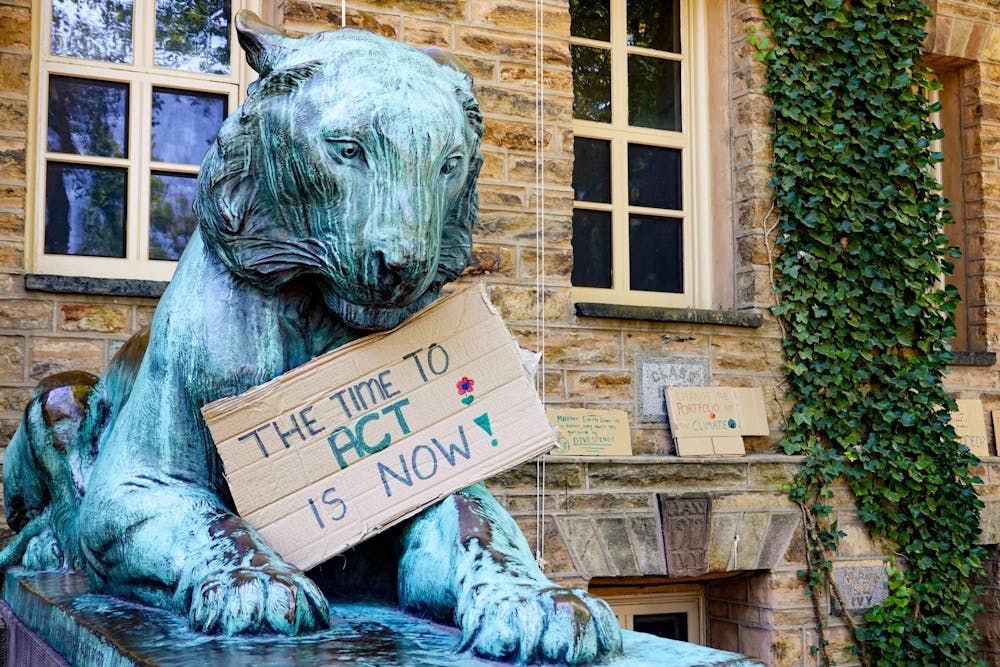Planetary breakdown worsens each day — and our language to describe it hasn’t caught up. Most of us call it “climate change,” or “global warming” if we’re old-school. While useful in certain contexts, these terms fail to convey the urgency of the dire situation facing our planet and our people — sometimes, they even conceal that situation. As a result, they limit our ability to feel and act from that urgency. Let’s change this language.
At Divest Princeton, the way we refer to imminent planetary breakdown has evolved over time. We use both “climate change” and “climate crisis” in our speeches and op-eds. I’ve started to favor the stronger language of the latter term, which better matches our sober reality and more forcefully transmits its emotional impact. I call on students, faculty, and administrators to make this linguistic switch too.
“Global warming” entered American discourse in the 1980s, culminating with climate scientist James Hansen’s famous testimony before Congress linking human fossil fuel combustion and increasing global average temperature. The term can be confusing, however. Because it refers to the average increase in global temperature, “global warming” does not inherently communicate how that average varies dramatically across place and time; sometimes, it’s still cold, even when, on average, everything is warmer! It also doesn’t immediately explain other effects of increasing greenhouse gasses in the atmosphere seemingly unrelated to increased temperatures, like the temporary blasts of extreme cold we experienced in the United States this winter. The fossil fuel industry and its enablers exploit this confusion to attack the reality of global warming.
Enter: “climate change.” The phrase has become ubiquitous, enshrined in international institutions and embedded academic and campus life. It more accurately evokes the variability of long-term effects from rising global temperatures on different climates. Not only do we experience extreme heat from higher temperatures, we also suffer changes like more frequent droughts, floods, hurricanes, wildfires, and freezes, as well as rising sea levels.
But limitations plague this term, too. Chief among them: “climate change” does not spark an emotional response. Early promoters of the term exploited this fact. Its initial booster was Frank Luntz, a public relations consultant during President George Bush’s administration in 2002. He advocated for the term in a Republican party memo because, as he explained in underlined words, “Climate change’’ is less frightening than “global warming.” The mildness of “climate change” that Lutz evokes in his memo — “less frightening,” and elsewhere, “less emotional,” and “more controllable” — downplays the existential threat of the phenomenon it attempts to describe.
“Global warming” can lead to misunderstandings and “climate change” lacks urgency. Both terms give rhetorical ammunition to climate deniers. That’s why we should consider using other terms in public discourse instead. “Climate crisis” is a good place to start.
Unlike its two predecessors, the term better fits the severity of the situation at hand. The planet is already falling apart — not in 10 years, not for the next generation, but right now — with deadly consequences for communities everywhere. As climate scientist Zeke Hausfather puts it, “my … colleagues and I have just about run out of adjectives to describe what we have seen.” Nevertheless, he attempted to give a description: “Staggering. Unnerving. Mind-boggling. Absolutely gobsmackingly bananas.” In this context, even “climate crisis” might not be strong enough of a term.
Yet still, it comes closer to provoking the intensity of emotion that today’s global devastation merits, in a way that “climate change” or “global warming” cannot. It concentrates each individual extreme weather event felt across the world and concentrates them into one word: “crisis.” The emotional effect is noticeable: according to one study, “climate crisis” elicits an emotional response from people that’s 60 percent stronger than that of “climate change.” Moreover, the term implicitly demands some sort of action. Framing the phenomenon as a crisis implicitly makes it something that can and should be resolved. Even if it doesn’t necessarily cause people to act right away, its direct connection with urgency helps people understand the danger of the situation.

Because of these advantages, we should move rapidly to adopt the term. University administrative departments like the Office of Sustainability already use “climate change.” They can update their style guides to favor “climate crisis” in relevant communications. This change should extend to other areas of campus life, from classrooms to dining halls: professors and students alike must employ “climate crisis” as the term of choice. Conceptual reframing requires all of us to be intentional about the language we use.
What we call the climate crisis shapes how we see it — and therefore, how we act in response to it. At the same time, switching the phrase we use to describe the effects of fossil fuel combustion and uncontrolled resource consumption remains just a semantic change, albeit one that informs the actions of politicians and the public. The next and more difficult challenge still remains: how we use this language to repair our broken world.
Columnist Alex Norbrook (he/him) is a sophomore from Baltimore, Md., and co-coordinator of Divest Princeton intending to concentrate in History. His real crisis is the state of his inbox at alexnorbrook@princeton.edu.









